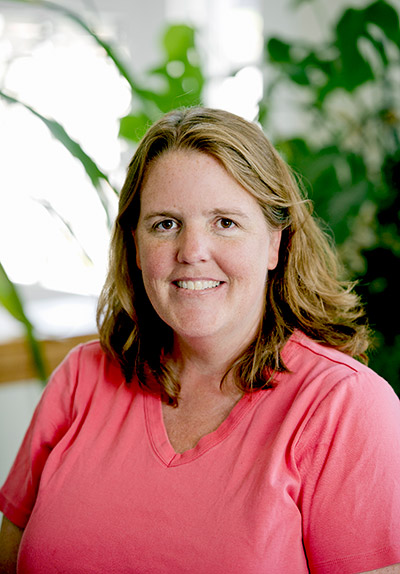For the Love of Math
Leslie Dietiker awarded $900K NSF CAREER grant

When teachers want to get their students excited about math, they often introduce a game or activity into the lesson in order to combat what has become, according to Leslie Dietiker, a typical disdain toward the subject.
“We’re perpetuating a generation who says ‘I hate math,’ or ‘I can’t do math,’ instead of being curious or excited about it,” she says.
However, Dietiker, an assistant professor of mathematics education at Boston University School of Education, also says that games aren’t necessarily the answer and ultimately won’t increase students’ enjoyment of the math itself.
“Games can make learning fun or make the time go faster,” she says, “but it also suggests that math can’t be interesting on its own—that we have to make it interesting by adding these other components.”
Dietiker is on a mission to make mathematics itself captivating, and she was recently awarded an $898,673 CAREER grant from the National Science Foundation to support her research. Her project is titled Designing and Enacting Mathematically Captivating Learning Experiences for High School Mathematics.
“I’m going to learn how and if teachers can design mathematical lessons that actually stimulate interest and motivate students,” she says. “Mathematics lessons can involve surprise or an element of suspense, and if done well, math can become provocative, or exciting, and super cool.”
She is quick to add: “Don’t get me wrong, I understand many people might think that’s impossible.”
Research shows that oftentimes students are provided, as learners, with math experiences that are viewed as dry or boring, and that students consistently approach math with the mentality of learning it just because it’s in their textbook.
“Rarely do students get experience with lessons where they want to know the math,” Dietiker says.
When it does happen, though, she says it’s often unintentional but that teachers—and likely students—walk away feeling more satisfied than ever.
“I’m on a mission to make students love math.”—Leslie Dietiker
“I’m pretty convinced that these are the days that teachers live for. If I can help teachers to purposefully design and enact captivating lessons, instead of experiencing them by chance, I could help make teachers feel that fulfilled everyday,” she says, adding that this work could therefore have implications on things like teacher retention and satisfaction.
“We may even get more students majoring in mathematics or math education,” she says.
Dietiker will work with a group of local teachers who will design lessons around whatever it is they might be teaching in their classrooms. She’s focusing on high school specifically, because she says that’s when students’ interest in math “dives.”
“In younger grades, 18% of students report that they do not like math. But by eighth grade, this proportion more than doubles (to 40% of students in the US) according to the 2007 and 2011 Trends in International Mathematics and Science Study report. Students tend to like math less as they learn more.”
She adds that, unfortunately, the trend shows that the problem is only getting worse.
“My hope is to demonstrate that what we’re doing now and the ways that we’re targeting mathematics teaching and learning right now are not working,” Dietiker says. “And I largely believe that’s because there’s been no focus on student experience. The focus is limited to the content that students need to know and how best to teach those concepts so that students understand it. Those are important goals, but they ignore the student experience and whether or not students will be curious or interested, or even enjoy learning math.”
After completing her research, Dietiker and the participating teachers will create a book of lesson plans that can be used as a resource and model for other educators.
“The goal is to provide examples of lessons that have been proven to excite students or to create certain types of experiences for students, and to provide explanation of why they work the way they do,” she says.
To test the lessons, students will be surveyed and interviewed about the types of experiences they had while participating in a particular lesson. If a lesson is purposely designed to be surprising or suspenseful, for example, Dietiker and her team will look to see how many times students specifically describe the lesson with those terms.
“It does us little good if a student understands a topic that they hate,” Dietiker says. “I’m on a mission to make students love math. I’m all about fostering that love.”
CAREER: The Faculty Early Career Development (CAREER) program is a foundation-wide activity that offers the National Science Foundation’s most prestigious awards in support of the early career-development activities of those teacher-scholars who most effectively integrate research and education within the context of the mission of their organization. Such activities should build a firm foundation for a lifetime of integrated contributions to research and education.
Comments & Discussion
Boston University moderates comments to facilitate an informed, substantive, civil conversation. Abusive, profane, self-promotional, misleading, incoherent or off-topic comments will be rejected. Moderators are staffed during regular business hours (EST) and can only accept comments written in English. Statistics or facts must include a citation or a link to the citation.